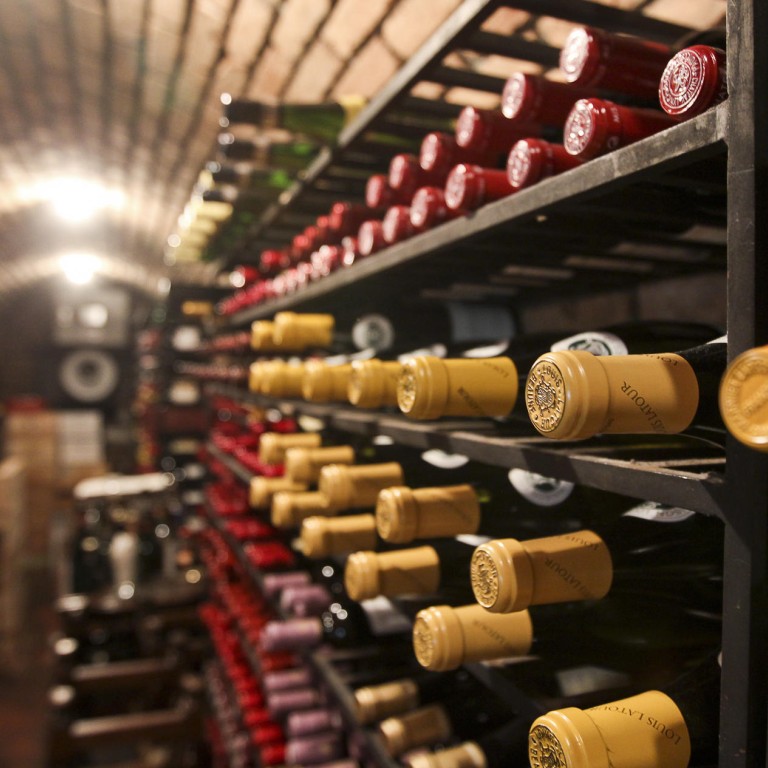
Xi's crackdown on cadres sees Hong Kong wine sales sour
Value of re-exports to the mainland has dropped 27pc since president ordered cadres to curb their lavish lifestyle
A crackdown on extravagance at official banquets on the mainland has battered Hong Kong wine traders' bottom line.
The value of the wine they re-export to the mainland has plunged nearly 30 per cent since President Xi Jinping ordered officials to stop their freewheeling ways.
"Business has been bad, bad and bad," said Marcus Chan Chun-wang, of Grand Cru Cellar International, which sells top French wines.
The volume of re-exported wine increased in the first half of the year but buyers are choosing cheaper varieties, leading to a drop in value.
At the end of last year, Xi announced "eight rules" on official behaviour to streamline bureaucracy and cut waste.

Provinces and municipalities have since rolled out detailed guidelines, some of which discourage liquor - especially pricey imported wines - at official banquets.
The Trade Development Council said the value of the city's wine imports in the first half of the year fell 3.7 per cent year-on-year to HK$4 billion in terms of value. Overall re-exports dropped 20.8 per cent to HK$775.2 million, with those to the mainland falling 27.3 per cent to HK$392.7 million.
Since Hong Kong abolished the wine duty in 2008, the value of wine exports - almost entirely re-exports - rose every year from 2009 to 2011. The first drop, 7.6 per cent, was recorded last year.
Local retail sales have also suffered. Sales of alcoholic drinks and tobacco dropped 21.9 per cent year-on-year to HK$2.65 billion in the first six months, according to the Census and Statistics Department.
It does not offer a further breakdown on wine.
TDC economist Wenda Ma said declines in wine exports in value terms reflected the lower prices rather than a slump in quantity.
Wine dealer Chan said mainland buyers now avoided any high-profile wine event out of fear of being labelled a big spender. "Top wines are being replaced by cheap alternatives at banquets - those where reporters are present," he said.
Some long-term clients continue to buy high-value wines while keeping a low profile, but it is extremely difficult for the company to reach new customers.
"You have to give potential customers a name card in the toilet, not in the open. It's like going underground to do business," Chan said.
With the slump in demand, some traders are selling off their stocks of high-priced wines - accumulated in the expectation of handsome profits - at cutthroat prices. "It's cheaper to buy French wines on the mainland or in Hong Kong than in France," Chan said.
Unlike local collectors who buy pricey wines for investment, a lot of mainlanders are drinking them at dinners, Wine Association of Hong Kong president Jacky Cheung Yiu-shing said. Therefore, liquor bans directly affected wine sales in the city, he said.
The Ministry of Commerce announced in June that it would look into the possibility of imposing "anti-dumping" duties on European wine imports following the European Union's decision to slap tariffs on imports of Chinese solar panels.
Some mainland importers were reported to have stocked up before a decision was made.
But such protectionist tariffs were usually aimed at the cheapest imports sold below "fair market value", Cheung said. Hong Kong, which focuses on high-end wines, would see little impact, he predicted.
Paulo Pong Kin-yee, of retailer-wholesaler Altaya Group, said prices of some trophy wines such as Chateau Lafite Rothschild fell by half last year.
But demand from other parts of the world, including the local market, had increased and prices had stabilised.
The company has seen increasing orders since the second quarter, as local buyers snapped up cases when prices dipped.
"As for China, the fine-wine bubble seems to have burst for now," Pong said.
The Liv-Ex Fine Wine 50, an index tracking the global price movements of 50 component wines, shows that the last 10 vintages of the five Bordeaux First Growths - Haut Brion, Lafite,Latour, Margaux and Mouton Rothschild - dropped from a peak of 445.4 in June 2011 to 297.1 in July 2012.
Wine prices bounced back slightly this year, with the latest July index at 314.3.
Hong Kong's ranking as a destination for Bordeaux wines in terms of value dropped from No 1 to No 3 - behind Britain and the mainland - last year, as Chinese wine lovers moved away from the priciest chateaus to more affordable choices.
